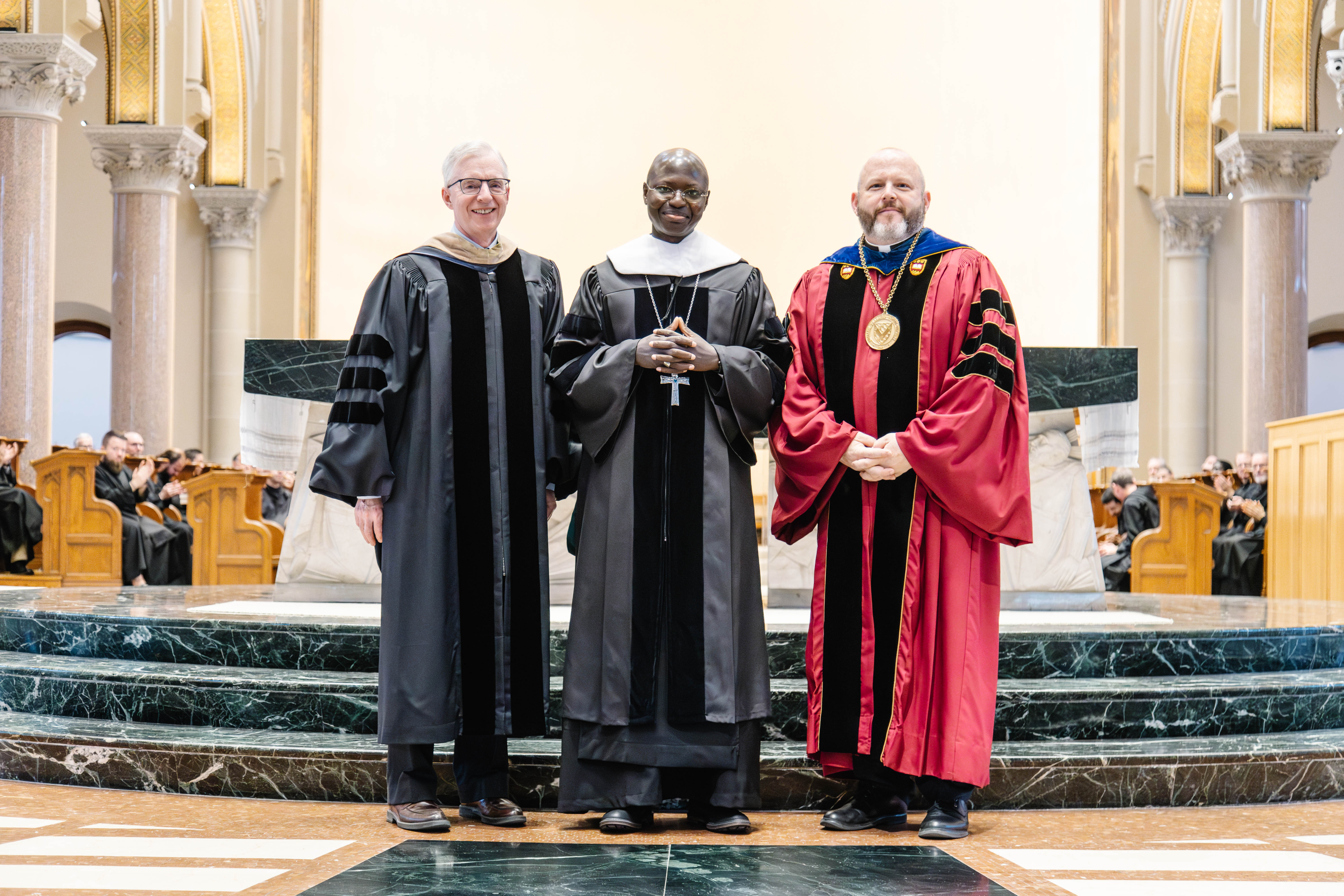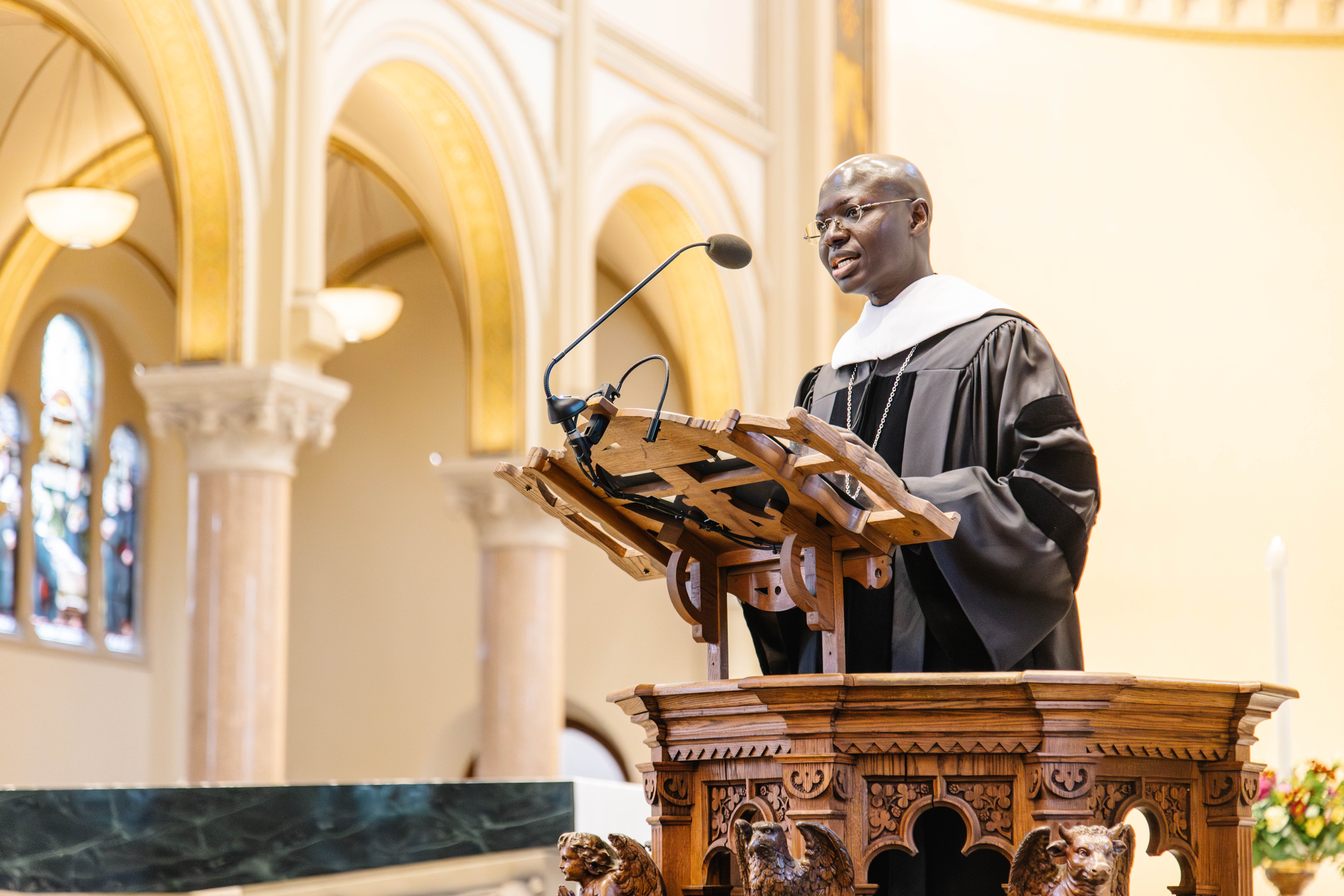Abbot Olivier-Marie Sarr receives honorary degree, delivers Honors Convocation address
Abbot Olivier-Marie Sarr receives honorary degree, delivers Honors Convocation address
-
Side Navigation
- Amazon Prime’s “The College Tour” set to showcase Saint Vincent College in upcoming season
- SVC Concert Series returns with performance from Sarah Richards
- Saint Vincent College to host book talk by Jim Rooney
- Saint Vincent College hosts annual Homecoming Weekend, announces Homecoming Queen and King
- U.S. News & World Report ranks Saint Vincent College as a top tier national liberal arts college for 14th consecutive year
- Saint Vincent College announces Bearcat Advantage financial assistance program
- Saint Vincent College engineering program receives ABET accreditation
- Saint Vincent College Women's Soccer to Support 'Vs. Cancer' Initiative
- Saint Vincent College welcomes new faculty for 2023-24 academic year
- SVC Concert Series presents organist J. Christopher Pardini and soprano Dr. Caryn Greko
- Saint Vincent College honors 40 women as part of 40th anniversary of coeducation celebration
- Dr. Helen Burns, SVC Nursing chair, receives Pitt Distinguished Practice Award
- Dean of Saint Vincent College’s McKenna School featured on the BBC
- SVC physics professors publish article regarding AI Writing in a classroom setting
- SVC Players to present “While the Lights Were Out” Nov. 3-5
- Saint Vincent College launches Bachelor of Science in Nursing program
- Saint Vincent College to present concert of Senegalese music
- Senator Kim Ward to deliver December commencement address at Saint Vincent College
- Saint Vincent, Verostko Center extend Impressionist Legacies exhibit through Dec. 8
- Saint Vincent to host next installment of Manoli Lecture
- SOLD OUT: Pittsburgh Symphony Orchestra to perform Handel’s “Messiah” at Saint Vincent Basilica
- Saint Vincent College hosts annual Founders’ Day celebration
- Dr. Stacy Birmingham presented with 2023 Projektenmacher Award
- Dr. Jessica Harvey receives Thoburn Excellence in Teaching Award
- Abbot Olivier-Marie Sarr receives honorary degree, delivers Honors Convocation address
- Saint Vincent College announces new scholarship, graduate study opportunities for economics students
- May 2023 graduates to attend graduate and professional school
- SVC to offer seven new business certificates
- SVC Education Department hosts Teach the Future Conference
- SVC’s Robert Markley interviewed on popular business podcast
- Saint Vincent College announces winners of high school mock trial competition
- Saint Vincent College awards more than 80 degrees at 2023 December Commencement
- Dr. Stephen Jodis appointed to Executive Committee of ABET Computing Accreditation Commission
- SVC’s McKenna school to offer seminar series in partnership with Greater Latrobe – Laurel Valley Regional Chamber of Commerce
- Student handbell choir to play in the McCarl Coverlet Gallery
- Winter 2023 commencement address by Sen. Kim Ward
- News 2023
LATROBE, PA—At the annual Founders’ Day Honors Convocation, Saint Vincent College president Rev. Paul Taylor, O.S.B., awarded an honorary doctorate of humane latters to Rt. Rev. Olivier-Marie Sarr, O.S.B., B.A., S.T.L., Ph.D., abbot of Keur Moussa in Senegal. Abbot Olivier also provided the Founders’ Day reflection.
“Today we honor a distinguished educator, scholar, musician, monk, priest and abbot for his outstanding work on behalf of the Benedictine Order and the Catholic Church and indeed the community of the whole world,” said Fr. Paul before presenting Abbot Olivier with the degree. “Abbot Olivier has been a wonderful ambassador [for the musical tradition of Keur Moussa] while being a role model for many. And so, for his longstanding dedication to serving people; using the music of the cora to illustrate the principles of Catholic faith; writing confidently on liturgical spirituality; and inspiring in people the importance of education, learning, and ethical living, Saint Vincent College is honored to confer upon Abbot Olivier-Marie Sarr of the Order of Saint Benedict, Ph.D., the degree of Doctor of Human Letters, honoris causa, on this sixteenth day of November, 2023.”
After being presented with the degree, Abbot Olivier delivered the Honors Convocation address, the full text of which can be found below.
About Abbot Olivier
Abbot Olivier-Marie Sarr is a Catholic priest and Benedictine monk who was elected as the abbot of the Abbey of Keur Moussa, a monastery near Dakar, Senegal on January 19, 2019. He has a background in liturgy and has earned a Ph.D. in the field from the Sant'Anselmo Pontifical Institute of Liturgy in 2012. He has written and co-authored several books on liturgy and has written 13 papers during his career.
Abbot Olivier has held several positions, including being a professor of Liturgical Spirituality, Theology of Inculturation and Methodology of Research at Sant'Anselmo Ateneo, Assistant editor of Ecclesia Orans, Subprior of Collegio Sant'Anselmo and a member of the Faculty Board at the Pontifical Institute of Liturgy. He has also taught liturgy at the Pontifical University of Saint Thomas Aquinas from 2013-2018.
He was nominated as a Consultor of the Congregation for Divine Worship and of the Discipline of the Sacraments by Pope Francis in 2016. He speaks Wolof, Serere, French, Italian and English fluently and has served as a valued member of the Sant’Anselmo schola cantorum—monastic choir leaders.
Abbot Olivier’s Honors Convocation Address
During the summer of 2010, I visited for the first time Saint Vincent, and I was considering the Archabbey and his College as a big village. Why, then?
It was not only because of this environment or that landscape, but it appeared to me like a village of education. As Saint Benedict wanted each Benedictine monastery to be “a school of the Lord's service,” Boniface Wimmer transformed this space into a village of education. That was, I presume, Boniface Wimmer’s dream: for knowledge, self-confidence, the feeling of being part of a family.
In this regard, Wimmer’s first intuition has a very strong echo in African Tradition, where we understand and accept that to educate a child you need a whole village, or, in other words, it takes a village to raise a child, and along with that, the importance of good teachers who are farmers and cultivators of human intelligence; could we add with the French author Victor Hugo, world famous for “Les Misérables.“
This is an educational alliance ideally sealed by all members of the village. Everyone, therefore, has a duty to support education, which is always a choral process, omnes partire (together), would add Saint Benedict. And is the matter of fact that in the Rule, chapter 19, verse 7, Saint Benedict tells the monks, to sing the Psalms ut mens concordet voci; it means that our mind may be in harmony with our voice. It is quite interesting that within the verb concordare (to be in harmony) we have the preposition cum and the substantive Cor, cordis, heart. So that the inner connection between mind and voice goes through the heart. Therefore, shaping and filling the heart will consequently affect the mind and the voice. In short, education must always be cum corde.
Antoine de Saint-Exupéry confirms this in “The Little Prince,” where he wrote these delightful words: ”You can only see well with your heart. What is essential is invisible to the eye.“ The profoundness of such a statement invites us to educate for spiritual intelligence—not just rational and emotional; spiritual intelligence is, in fact, "the ability to take account of invisible things that seem infinite—love, truth, God—and to find pleasure in the immaterial.” This is why music, philosophy, poetry, art, the inner life, spirituality, contemplation and compassion—in short, anything that allows us to contemplate the invisible, to arouse intuition and creativity, to renew the way we look at ourselves and those around us—must be introduced and maintained in the educational curriculum.
As Benedictines, then, we educate cum corde, as Boniface Wimmer put it: “In our monastery, in the missions, in the care of souls, in literary studies, in promoting the liberal arts, in the splendor of the public liturgy and in the education of youth.”
The Benedictine education is therefore promotes the hallmarks of love, prayer, stability, conversatio morum, obedience (as beautifully understood by Saint Benedict, that is), discipline, humility, stewardship, hospitality and community.
Therefore, Saint Vincent College is not only about professional abilities, but always offers opportunities and surpassing all expectations that Wimmer wanted. It takes a whole Benedictine College like Saint Vincent to raise a citizen of the world, to be a bridge builder, a peacemaker, through self-discipline, patience and perseverance. So that we become more and more less greedy, more serene, more respectful, less anxious, more fraternal and to build natural aptitude and do good around us and in the world. In other words, it's a matter of moving, from consumption to sacrifice, from greed to generosity, from waste to the ability to share, in an asceticism that "means learning to give, not simply to give up.”
To this end, the Benedict education is the place of human development where several dimensions of life are at stake: creativity, projections towards the future, development of abilities, putting values into practice, communication with others." In short, education is a path to maturation, human development and personal fulfillment.
That is why the legendary President of South Africa, Nelson Mandela, emphasized that, “It is through education that the son of a mine worker can become the head of the mine; that a child of farm workers can become the president of a great nation. It is what we make out of what we have, not what we are given, that separates one person from another.”
In conclusion, according to Mandela, “Education is the most powerful weapon which you can use to change the world.” And in the Benedictine context, this weapon of education proceeds cum corde. Because it tries to spread a new paradigm concerning the human being, life, society and the relationship between many cultures and beliefs.
In order to achieve that goal, the once Archbishop of Milan Carlo Maria Martini was fond of saying: “Educare è come seminare: il frutto non è garantito e non è immediato, ma se non si semina è certo che non ci sarà raccolto,” which translates to “Educating is like sowing: the fruit is not guaranteed and is not immediate, but if you do not sow it is certain that there will be no harvest.”
Yes, good school education, from the earliest age, sows seeds that can produce lifelong effects. To make it happen nowadays, we need a village of education like Saint Vincent College where teachers are farmers and cultivators cum corde of human intelligence.
Forward, always forward, everywhere forward! Cum Corde!
PHOTO 1: Dr. John Delaney, vice president of academic affairs and academic dean; Abbot Olivier; and Fr. Paul pose for a photo after Abbot Olivier was presented with his honorary degree
PHOTO 2: Abbot Olivier delivers the Honors Convocation reflection
